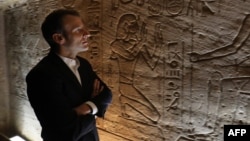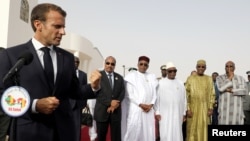French President Emmanuel Macron left a France roiled by ongoing yellow vest protests for another tumultuous region — the Middle East — and talks with his Egyptian counterpart Abdel Fattah el-Sissi on regional politics and weapons sales, shadowed by the looming U.S. troop pullout from Syria.
Macron’s three-day Egypt visit, his first official trip there since taking office in 2017, underscores that country’s role as vital ally in the fight against terror and hub of stability in a restive region.
Crucially, too, Cairo is a big-spending client for French weapons manufacturers, buying warships and fighter planes, with more potential sales in the pipeline.
Human rights pressure
But the French president is facing heavy pressure to speak out against allegations of widespread human rights violations in Egypt, including those reportedly using equipment purchased from France. Adding to the pressure is a letter written to Macron by the family of a French teacher killed in police custody in 2013, calling for the “truth” behind his death.
“I imagine that President Macron is going to attempt to walk a fine line,” between raising rights concerns and prioritizing regional stability and security, said Dana Stroul, senior fellow at The Washington Institute for Near East Policy.
Macron’s first task on his arrival Sunday was less controversial: visiting the temples of Abu Simbel in Upper Egypt with his wife, Brigitte. Talks later with Sissi are expected to range from reinforcing economic cooperation, to the Israeli-Palestinian conflict, to Libya and Syria.
Place on world stage
Since taking office in 2017, the 41-year-old Macron has pushed for greater French clout on the world stage. He has hosted summits on climate change, peace, the Sahel and Libya. He criticized the Trump administration’s decision to pull out of Syria, saying “an ally must be dependable,” and that France would remain militarily involved in the region.
But Paris is no substitute for Washington, experts note, and French troops are already stretched in the Sahel. Still, Stroul believes France can partially help fill the U.S. withdrawal gap in other ways.
“What the French and the Europeans can do is play a much more robust diplomatic role in insisting the U.N. process be used for a political transition in Syria, and more robustly using sanctions and the potential to contribute to reconstruction as a leverage,” Stroul said.
Those measures, she added, will help ensure “the U.S. withdrawal does not just leave a vacuum for Russia, Iran and other adversaries to fill.”
Weapons deals
Potential weapons deals are also expected to headline Macron’s Egypt talks. One of the world’s top arms exporters, France has supplied Egypt with warships and cruise missiles over the years, and Cairo was the first client to buy French Rafale fighter jets, says Paris-based defense expert Pierre Tran.
“Egypt is a very important arms client for France,” Tran said. “It effectively bailed out France by buying two Mistral helicopter ships that France had to buy back from Russia” because of a canceled deal.
France’s La Tribune newspaper speculated Egypt would agree to buy dozen more Rafale fighter jets during Macron’s visit, but the French presidential palace has reportedly said there will be no announcements during this visit. Discussions over the Egyptian purchase of two more French corvette warships, on top of four already bought, are also at “an advanced stage,” France’s Le Monde newspaper reported.
Activists detained, tortured
More certain is pressure at home for the president to speak out about rights abuses, including those tangling French weapons sales. Human rights advocates blame Egypt for detaining and torturing scores of activists over the years since the 2013 coup, among other repressive measures.
An October report by rights group Amnesty International claims French military and security equipment was used by Egyptian security forces in “brutal repression.”
And a recent report by nongovernmental group Front Line Defenders described worker abuse at an Alexandria shipyard building corvettes in partnership with the French company Naval Group, a practice that reportedly flouts France’s laws requiring French firms to establish mechanisms to prevent right abuses.
“France has been nurturing the dictatorship by equipping it with weapons and surveillance equipment, which has allowed the regime to go after the population and human rights activists,” said Antoine Madelin, international advocacy director at the Paris-based International Federation of Human Rights, or FIDH.
During talks with Sissi in Paris in 2017, Macon gave the Egyptian president a list of Egyptian prisoners of whom he demanded the release, and the government says rights remain a priority for the French president.
“We engage in open and regular dialogue with Egypt on the issue of human rights,” a French foreign ministry spokeswoman told reporters ahead of Macron’s trip, saying such talks would continue including on individual rights cases.
But rights groups say Macron’s government has not done enough.
“The French government is facing a moral failure for not putting human rights in front of its economic interests,” Madelin of FIDH said.
Adding to the pressure is a recent letter to Macron by the family of slain French teacher Eric Lang, who had been living in Cairo for 20 years. In 2013, he was allegedly beaten to death while being detained in an Egyptian prison. Six Egyptians were jailed for his killing, but the family has blamed Egyptian police.
“We don’t understand why our country abandoned a French citizen and didn't put all its political weight to shed light on his death,” wrote Lang’s sister and mother.
Still Egypt’s role as a key stabilizer and regional, if waning powerhouse, is key for France and other western countries. Both countries are concerned by the turmoil in Libya, migration, and other sources of regional instability, including terrorism.
On Libya, French efforts to increase its influence in the North African country’s politics has led to a power rivalry with Italy that some analysts believe undermines U.N. peace efforts. Both European countries hosted summits last year on Libya’s future. December 2018 elections in Libya, agreed to during the French summit, have been postponed amid ongoing fighting by rival militias, among other roadblocks.







